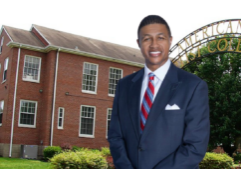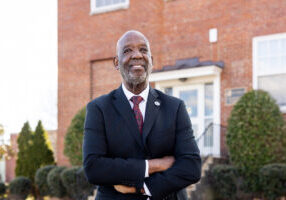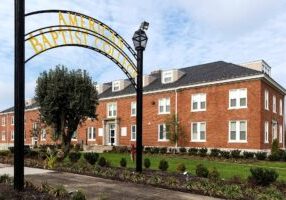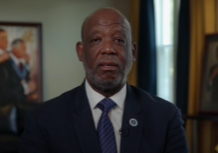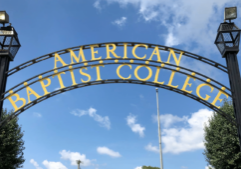By William V. Green
The thought for the subject, A Portable Pulpit was inspired from a conversation that I had with Pastor Napoleon Harris, who is a 1985 graduate of the American Baptist College. The context and content of our dialogue was sparked by the person, work, life, and death of Congressman John R. Lewis and Rev. Dr. C.T. Vivian.
The individual and the mutual contributions of these men, to our nation and the world, has allowed us to experience so many awe-full moments. In contrast both men encountered the awful moments of racism, discrimination, beatings, imprisonment, and various horrible experiences. Their hardships parallel the Apostle Paul’s story in 2 Corinthians 11:23-28, “I’ve done much more work, been in prison many times, been beaten severely, and have faced death more often than most. I have faced dangers for my people and from other people. I have faced dangers in the city, in the open country, on the sea, and from believers who turned out to be false friends…” This biblical reference is a reminder that when one is in the will of God, he or she may end up in trouble. Congressman John Lewis understood this reality and called it “good trouble.” Trouble that is good is what can happen when a person chooses to obey God instead of men. Good in this context means for the benefit of all despite differences.
These two saints are modern-day versions of John the Baptist. Luke 3:1-6 reveals the value of John the Baptist’s life, and I see the similarities of Congressman Lewis and Dr. Vivian. Additionally, the ministry of John the Baptist is dated with secular history. In this Luke passage, there is a list of names and together, the titles indicate and establish the dark religious and political ambiance of the Roman/Palestinian governance.
At first glance, John’s name is mentioned on the list with these great people, but the truth of the matter is, the famous people are only named because of John, who is God’s representative. There is a valuable perspective with the listing of the names. I do not recall the origin of this outlook; nevertheless, it is appropriate for this occasion. “Since some things in life are passing and some things are permanent, the question becomes, to which are we connected? The essence of the list is the contrast between the passing and the permanent. Eternity is stamped on what John did, and temporary is stamped on the others.”
Dr. Vivian and Congressman Lewis made contributions that have the stamp of permanency and perpetuity. The question that demands action and an answer from us is to which have we connected, the passing or permanent?
It is remarkable and divine that both men are alums of American Baptist College (ABC) and would transition to life beyond this world on the same day. Although they are no longer present with us physically their impact and influence will forever be a part of the flame of (ABC).
As a tandem, I think history proves that they were modern-day versions of Paul and Silas. They helped each other get through many difficult times together. Both men were protesters to the systems of that day that devalued, demeaned, and discriminated against the “other.”
Paul and Silas were beaten and imprisoned for their biblical faith-rooted justice work. Without question, they willingly carried the message of Christ to offer equity, inclusion, liberation, justice, solidarity, and resiliency. This is precisely the history and legacy of Dr. Vivian and Congressman Lewis.
Both were ordained ministers who had portable, transferable, and moveable pulpits. Portable in this milieu is not referencing the podiums in the buildings of brick and mortar, nor the current online version of church. The idea of the pulpit as described by the late Rev. Dr. A.L. Patterson fits this occasion. The word “pulpit” is an impression of the miraculous collaboration of human responsibility and divine sovereignty to pull people from their pits.
However, more than ever before, with this pandemic and the requests to not gather in church and school buildings, we need women and men to have portable pulpits. We need leaders to respond to the call of souls flourishing for every human being.
The late Rev. J.P. Wilson from Saginaw, Michigan, once said, “God will create an event to see who will show up.” It is the thresholds and events of everyday life that calls and invites each of us to prophetic and practical ministry. This is the prophetic work in which God invites all of humanity, particularly those who claim to know God, to show up for an event.
Reggie McNeal says, “This call is divinely orchestrated. God’s part of the call dynamic is to initiate, guide, position, and intervene. The leader’s part of the call drama is to hear, respond, search, and order or reorder life. The call is a mystery, it begins and ends with God, but it loops through a very human individual. Those who describe themselves as called mean that they have made a commitment of life into God’s service, to be at God’s disposal, to be God’s employee for the efforts of accomplishing God’s agenda. Leaders convinced of their call do not easily succumb to disappointments and discouragements. Nor do they calculate odds in the same way as those who are not operating on a call basis. Leaders secure in their call will charge hell with a water pistol.”
McNeal’s explanation of call reminds me of Lewis, Vivian, and so many others. Those who served the call of their vocations know that God moves outside of institutional religion as well as within institutional religion.
As I close, pun intended, we will begin the fall semester in a few weeks. We will gather virtually and continue distancing learning. May each of us examine our lives through those who have influenced and impacted us in a meaningful way.
Lastly, I want to encourage you to prepare for our online chapel experiences that will begin soon. Our gathering will extend and expand and broaden the idea of our personal and collective pulpits to be portable.


